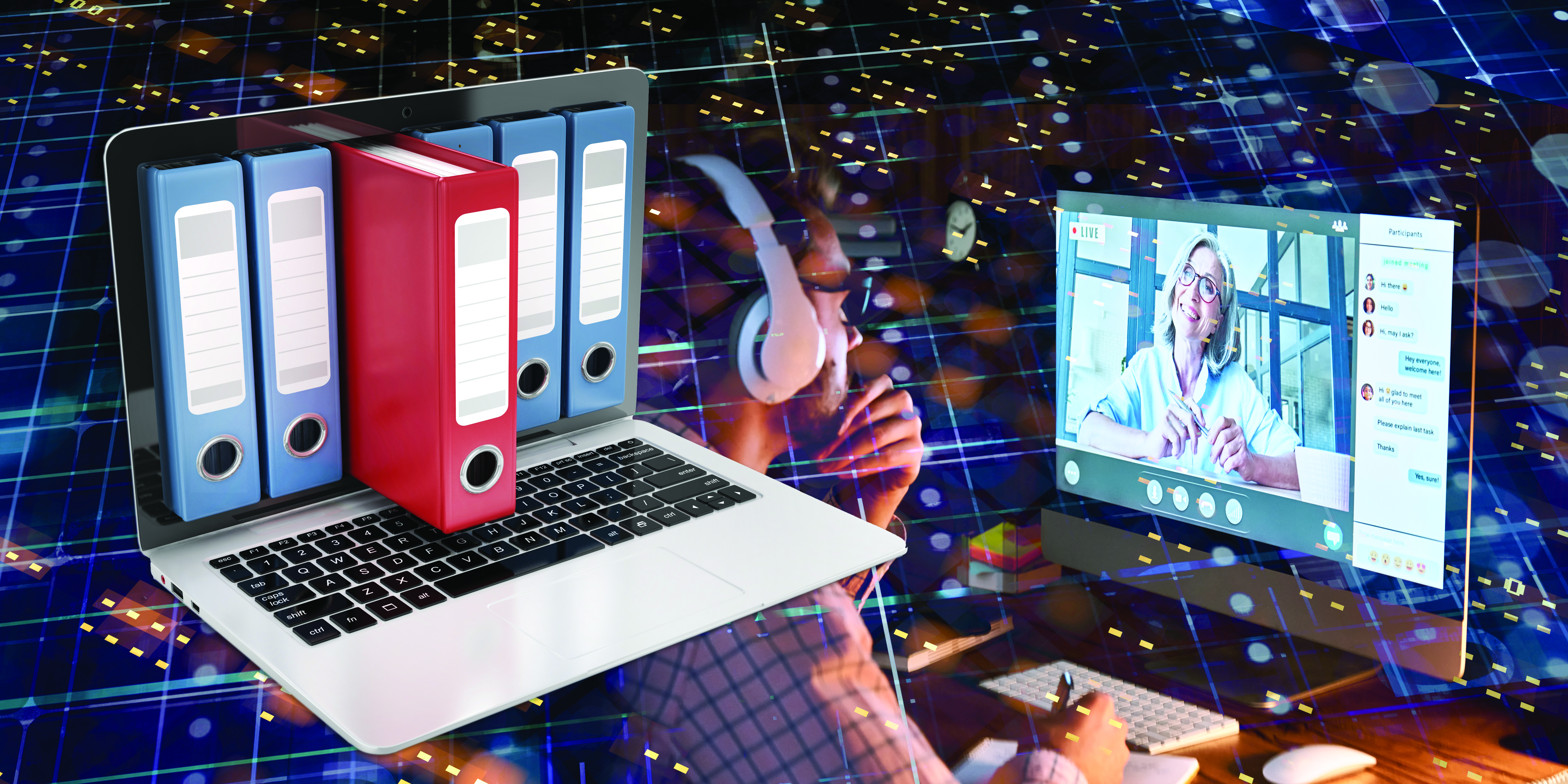Thanks to the pandemic, law firms have embraced remote e-discovery

Photo illustration by Sara Wadford/Shutterstock
There was a time when the managed review portion of e-discovery projects—or “document review,” as it’s colloquially known to those who practice it—was conducted exclusively in the dowdy back rooms of legal staffing agencies. Teams of attorneys hired on contract would sit at laminate classroom-style tables, usually shoulder to shoulder and often amid clutter, scrolling through hundreds of electronic files a day. It was understood, but still repeated on every review, that all work took place inside that room to safeguard clients’ confidential information.
Then COVID-19 hit. And like so many other companies around the world, law firms and staffing agencies were forced to find a way to conduct business remotely.
Three years after the reviews went home, law firms are discovering that the remote model they once viewed with great suspicion can enhance rather than endanger their projects. As a result, reviews are showing no signs of ever returning exclusively to the back room.
“I definitely think pre-COVID, the idea of remote litigation document review was really unusual,” says Ryan Guilds, counsel at Arnold & Porter. “There were significant concerns about security, a desire to make sure there was proper supervision, and the ability to quickly and efficiently answer questions. I think most people hadn’t gotten over the hurdles that technology could bring.”
Guilds was overseeing a major document review project with several hundred reviewers in two locations when the pandemic hit. He recalls that there was great consternation at Arnold & Porter around moving such a massive undertaking outside the review room. He credits the staffing agency running the project, Hire Counsel, with helping get the firm over that hump, noting it “got into the weeds” ensuring reviewers had the proper equipment to take home and setting up additional layers of security and quality control to show the firm the project would not suffer during remote work.
“I think we got from concerns, in a matter of weeks, to a level of comfort,” Guilds says.
Once firms reached that comfort level, they never looked back.
“It’s a very rare occasion when someone comes up and asks for a review in a brick-and-mortar building,” says Eric Crawley, senior vice president of legal solutions at Epiq, one of several staffing agencies that assembles teams of contract attorneys to conduct document review projects.
Positive reviews
The major benefit of remote work is the ability to draw from a nationwide pool of reviewers on each project rather than hiring attorneys only from one of the relatively few metro areas where agencies previously hosted projects.
 Eric Crawley
Eric Crawley“Now you can really formulate the best review team with the best skills and qualifications, irrespective of where they’re located,” Crawley says. He adds that this has enabled Epiq to offer “a different delivery model” for e-discovery, with review teams dedicated to specific firms or assembled for their expertise in certain practice areas. “These were harder things to do pre-COVID because most reviews were organized around where people were geographically.”
The move to remote work also opened up document review to contract workers who might not have considered it previously.
“You can get perhaps a better pool of talent because you can attract the type of talent that can’t sit in a room from 8 to 5 every day for a variety of reasons,” Guilds says.
And it should come as no surprise that reviewers also strongly prefer remote work.
Doug Austin, editor of the eDiscovery Today blog, pointed to a survey of more than 500 document reviewers that found fewer than 20% were interested in on-site work, while nearly all were interested in remote work. (The nonscientific survey was conducted by ComplexDiscovery, an online publication that conducts original research on issues affecting e-discovery and cybersecurity, among other issues.)
“It was pretty stark in terms of where reviewers would like to be,” Austin says. “It was like, ‘If I got paid more, then I would consider on-site review.’ But comparing apples to apples, they were a lot less interested in on-site review than remote.”
The firms’ initial fears about security and confidentiality haven’t proved to be a barrier to remote work.
“Confidentiality and security is no different than the way it was,” says Shamus Flower, executive vice president at Consilio, another staffing firm. “A bad actor is a bad actor. The propensity for someone to be a bad actor didn’t increase with the move to a remote environment.”
Instead, the main drawback has been the loss of the personal interaction. When reviews were on-site, reviewers would openly discuss coding decisions in the room, with the whole team within earshot. Team leads could easily pull a reviewer aside for a quick chat to bring them into alignment with everyone else. In lots of ways, the close quarters bred consistency and accuracy on a review.
 Robert Keeling
Robert Keeling“Productivity itself—documents reviewed per hour—has not changed,” Crawley says. “What has been more challenging has been monitoring quality.”
Law firms have used various techniques to try to replicate the collaborative aspect of reviews in the remote space, including regular check-in calls or Zoom sessions; posting a survey question in Teams or requiring a thumbs-up response to posts to ensure people are reading their Teams feed; and breaking large teams into small groups with a team lead assigned to each one.
“It is a challenge, given that nobody’s in the same room anymore,” says Robert Keeling, head of Sidley Austin’s e-discovery and data analytics group. “You just have to think about different approaches to maintaining the same level of constancy and same level of quality as when you were in the same room.”
This story was originally published in the August-September 2023 issue of the ABA Journal under the headline: “A New Discovery: Thanks to the pandemic, law firms have embraced remote e-discovery.”
Write a letter to the editor, share a story tip or update, or report an error.



